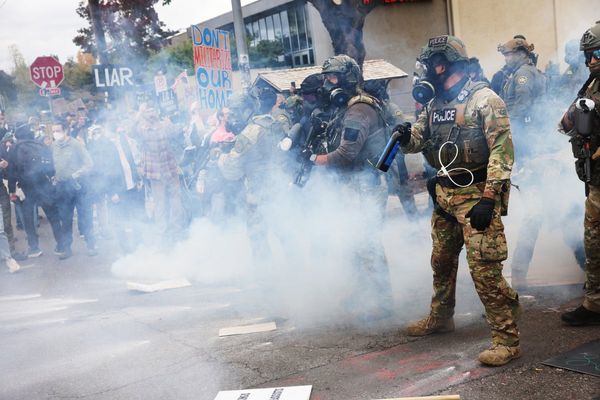
Yasmin Javed is showing the camera childhood photos of her daughter Fawziyah, from beautiful baby to toddler who can hardly keep still to grinning child with huge shining eyes. “Sorry,” says Yasmin, gathering them up. “I can’t do any more.” Fawziyah, an only child, grew up, fulfilled her ambition to become a lawyer – there are graduation photos, too – and died two years ago at the age of 31, while 17 weeks pregnant with her first child. “The life I had, that’s gone, that’s finished,” says Yasmin, whose face and body seems carved out of grief. Even more than the photographs, the footage of the family holidays, the beaming selfies taken with friends and family, it is Yasmin’s stricken stillness that gives the measure of the loss.
The Push tells Fawziyah’s story as it follows the trial of the man accused of pushing her to her death from the rocky summit of Arthur’s Seat in Edinburgh – her husband Kashif Anwar. “As the trial starts,” the film’s interviewer asks Yasmin, “what’s going through your mind?” “Hate,” says Yasmin, without heat. “Hatred for him.”
Trials can be filmed in Scotland and we watch as prosecuting counsel Alex Prentice builds a picture of the relationship between Kashif and Fawziyah, which is supplemented for the viewer with further contributions sensitively woven in from her mother, uncles and friends. Her uncle Shahid never liked his arrogance or felt he was good enough for his beloved niece (“But she had made her choice and I had to accept that”). Ingrid, a fellow solicitor, was made uneasy by how many pictures Fawziyah would take and send back to her husband while they were out, as if to prove where she was and with whom. The first time Yasmin knew that something was wrong was when Fawziyah reminded Kashif to put his seatbelt on and he turned on her in fury.
In court, recordings are played of phone calls between the couple when Fawziyah was staying with her parents for Ramadan and Kashif wanted her to come home. “Who the fuck do you think you are?” he says. “You’re a disease in everyone’s life. The sooner you’re dead or the sooner you’re out of my life the better.” If he had been willing to let her go, the story could have ended there – an unhappy episode for the woman and her family but one they could have recovered from, survived.
By the time of the calls, Kashif had already induced Fawziyah to come off social media, blocked male members of the family on her phone and transferred £12,000 from her bank account to his own. Not long after the calls, Yasmin had sat with her daughter as Fawziyah reported her husband to the police for punching her face through a pillow while he told her she was never going to leave him, that he would finish her, destroy her. The defence makes as much as it can of the fact that she just asked the police to log the incident, and went back to her husband.
To call it a classic case of coercive control fails to capture its gradually enveloping nature. It is the normalisation of extraordinary horrors, the warping effects of growing fear that characterise it and give it a strange ineffability. Fawziyah was hospitalised during her early pregnancy, and a witness cries in the dock as she testifies about a visit from Kashif during which he tells his “bitch” wife that he hopes she dies in childbirth and blames her for “bringing out this side of him”.
When Fawziyah fell from the cliff top – slipped, insists the defendant – Kashif called his father rather than 999. He claimed to a walker further down the hill that his phone was dead and asked him to call an ambulance. To the first two people who found her – just conscious – she said that her husband had pushed her. Defence counsel says this is her misinterpretation of him trying to save her as she slipped.
The trial turns on whether the pattern of Kashif’s behaviour is evidence enough to convince the jury, in the absence of any witnesses, that Fawziyah’s assertion is the right one. The tension as the verdict is awaited creates a heightened version of the question that permeates the whole film – how does the family bear such suffering? How do any of the families of the two women a week killed by their partners in the UK alone bear such suffering? And what of the untold numbers of women secretly suffering through domestic violence now?
That Kashif is found guilty and sentenced to a minimum of 20 years in prison is some justice. Kashif’s father says that he still hasn’t got Fawziyah’s £6,000 engagement ring he paid to get back from the police.
The programme is careful to include a scene at the family’s mosque in which their imam (I presume) makes clear that domestic violence has no place in Islam and that divorce does. But any woman watching – and any man with any sense – knows that what happened here, what happens across the country, across the world and across history has nothing to do with religion. It’s a far deeper and more ancient impulse at work.
The Push: Murder on the Cliff is on Channel 4.







